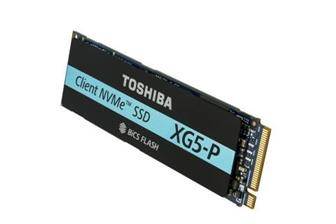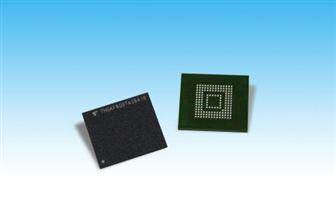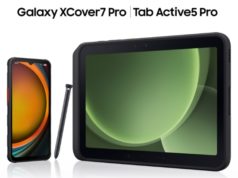
- Register
- Login
24°C
- Article
- . (0)
- Related content
Toshiba Memory has enhanced its line-up of client SSDs with the launch of premium models in its XG5-P series. The new NVM Express (NVMe) client SSDs improve on the performance of the current XG5 series models and double the maximum capacity to 2TB.
Sample shipments to OEM customers have kicked off in limited quantities, and Toshiba Memory will gradually increase shipments from the first calendar quarter of 2018, the company said.
The XG5-P series also utilizes a PCI Express (PCIe) Gen3 x 4 lane and NVM Express Revision 1.2.1 interface, and delivers performance of up to 3000 MB/s sequential read and 2200 MB/s sequential write, and up to 320,000 IOPS random read and 265,000 IOPS random write. Its random read/write performance in full access range is approximately 55% better than that of standard XG5 series products. At the same time, low power consumption is maintained at less than 60mW during operation.
The new XG5-P series is housed in a standard M.2 2280 form factor and will be available in two capacities, 1TB and 2TB. By utilizing the company’s 64-layer, 3D flash memory BiCS FLASH 1TB package developed in-house, the 2TB model offers twice the maximum storage capacity of the standard XG5 series on the same 2.23mm, lightweight single-sided M.2 2280 module. By maintaining a single form factor for all capacities across the XG5-P and XG5 product families, Toshiba Memory makes it easier to design platforms that need flexible storage.
The XG5-P SSDs will also be available in self-encrypting drive (SED) models supporting TCG Opal Version 2.01, contributing to a wide range of applications including workstations, gaming PCs and read-intensive enterprise use.
In a separate statement, Toshiba Memory announced it has started sampling Universal Flash Storage (UFS) devices utilizing the company’s 64-layer, BiCS FLASH 3D flash memory. The new UFS devices meet performance demands for applications that require high-speed read/write performance and low power consumption, including mobile devices such as smartphones and tablets, and augmented and virtual reality systems.
Toshiba Memory’s new line-up of UFS devices will be available in four capacities: 32GB, 64GB, 128GB and 256GB. All of the devices integrate flash memory and a controller in a single, JEDEC-standard 11.5x13mm package. The controller performs error correction, wear leveling, logical-to-physical address translation and bad-block management, allowing users to simplify system development.
All four devices are compliant with JEDEC UFS Ver2.1, including HS-GEAR3, which has a theoretical interface speed of up to 5.8Gbps per lane while also suppressing any increase in power consumption. Sequential read and write performance of the 64GB device are 900MB/s and 180MB/s, while the random read and write performance are around 200% and 185% better, respectively, than those of previous generation devices. Due to its serial interface, UFS supports full duplexing, which enables both concurrent reading and writing between the host processor and UFS device.

Toshiba Memory NVMe client SSD premium model XG5-P series
Photo: Company

Toshiba Memory UFS devices utilizing 64-layer, 3D flash memory
Photo: Company
-
Hinge maker SZS diversifying product lines with higher MIM capacity
IT + CE | 1h 13min ago
-
Cleanroom constructor UIS seeing orders swell, says report
Bits + chips | 1h 19min ago
-
Taiwan market: LG sees growing profits from OLED TV sales
Displays | 1h 21min ago



- China AMOLED panel capacity expansion forecast, 2016-2020
This Digitimes Research Special Report examines the China AMOLED industry, focusing on the expansion capacity of the makers, the current implementation plans of major smartphone vendors in the market and the technological hurdles faced by the China makers.
- Global AP demand forecast, 2017-2020
Digitimes Research expects global AP shipments to surpass the 1.9 billion mark in 2017, with smartphones remaining the main application. Qualcomm will be leading the market in 2017, as other players continue playing catch up and scramble for funds to invest in more diverse applications.
- Global notebook shipment forecast, 2017 and beyond
This Digitimes Special Report examines key factors in the notebook industry, including products, vendors and ODMs, that will affect total shipments in 2017 and through 2021.






![[Video] Reimagined for Orchestra, ‘Over the Horizon 2026’](https://loginby.com/itnews/wp-content/uploads/2026/02/Video-Reimagined-for-Orchestra-‘Over-the-Horizon-2026’-100x75.jpg)

